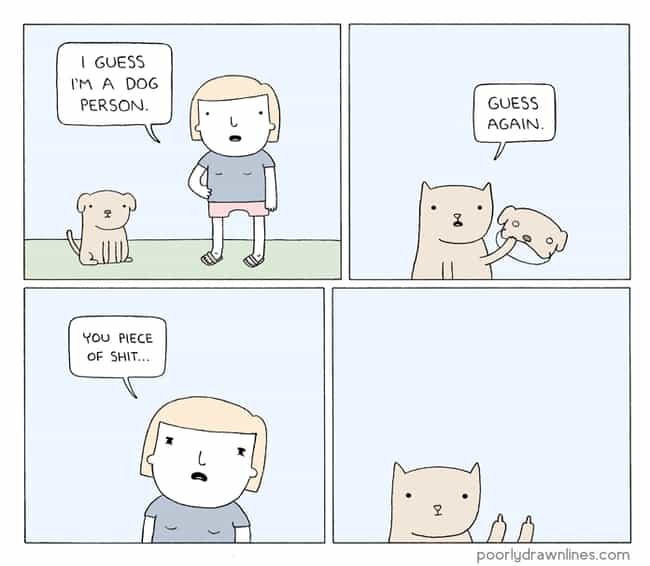Poorly Drawn Lines
By Reza Farazmand

This is a collection of short panel comics by Farazmand, who got his start online (and is still there, I assume). These are mostly 4-6 panels apiece, with some longer ones mixed in. They've got that off-the-wall humor which I enjoy, talking animals and inanimate objects, birds judging how well you sing, aliens who just want friendship bracelets, thirty-seven year-old babies with beards, weirdly tall frogs, robots who suck. It's got a bit of that
Far Side influence, but it feels a bit more Dada-esque (yeah, I know shit). One thing I didn't like was the formatting - if you have a four-panel page, but a six panel comic, for the love of god, just make it smaller and put it on one page! It makes it weirdly hard to figure out if the small panel is a continuation of the previous page or a new comic. Same for the eight (or more) panel comics. When stuff is online first, you don't have the same space restrictions you'd get if they were published in the newspaper. So they're all different lengths. But you gotta solve that problem when you publish - and I don't think they've quite cracked the code yet. But overall, a fun diversion, and a good gift for someone with that absurd sense of humor.
Through The Woods
By Emily Carroll

This is sort of the antithesis to
Poorly Drawn Lines: short stories instead of panels, arty illustrations instead of block characters, horror instead of comedy, confusing instead of straightforward. I got this because I wanted some spooky stuff to read, and they were definitely -
atmospheric - but I felt like a lot of them were kind of ended the same way: you have a set up with a spooky premise (I killed my brother but he's standing right there drinking, a lady is hearing a chilling song in the floorboards, my friend has a cloud thing that has arteries over her head, my mother warned me about the piano-teeth monster, etc), and then the character takes further action (goes down a hole to follow a monster [in several stories, actually, they should probably stop doing that], cracks open the walls and finds body parts, discovers someone is missing, etc) there's maybe like a
little more explanation or clues about what's going on, but mostly not, and then we end with, like an ominous close up (of the monster, of the piano teeth, of the beating heart cloud, etc) but honestly, some of it (most of it) is so confusing, I can't figure out enough of what's going on to be scared. For example, in the piano teeth one, Emily follows Rebecca down a hole and see her face come off into red worms, and then she leaves and hits her head and comes to back at the house, where she talks Rebecca out of using her body as a sack for Rebecca's red worm babies. But then at the end, we find out Emily has piano teeth too. So..... is she already a red worm monster? Did Rebecca change her mind and use her body anyway? It's so weirdly obtuse. And the one where the brother is killed and then comes back, the narrator follows him down a hole he's been digging, and then sees... someone sleeping on the ground? The wolf the brother killed earlier? The brother
is the wolf? Totally unclear. Anyway, beautifully illustrated, but a bit obtuse for me.

